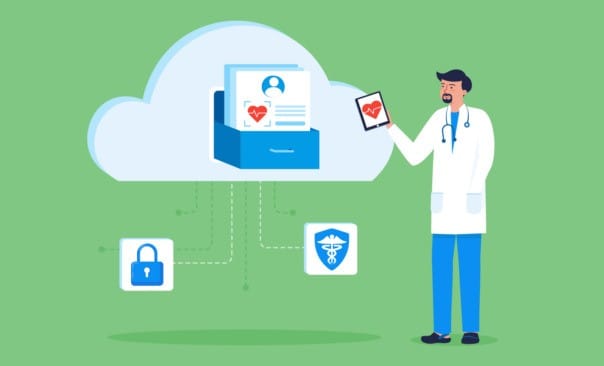Risk Assessment and Management for HIPAA Cloud Solutions


In today's digital healthcare landscape, cloud solutions offer unprecedented scalability and efficiency. However, with these benefits comes the critical responsibility of ensuring HIPAA compliance. This comprehensive guide explores the essential steps for conducting a thorough risk assessment and implementing effective management strategies for HIPAA-compliant cloud solutions.
Understanding HIPAA Compliance in the Cloud
The Health Insurance Portability and Accountability Act (HIPAA) sets stringent standards for protecting sensitive patient data. When healthcare organizations migrate to cloud environments, they must ensure that their cloud solutions meet these rigorous requirements.
The Shared Responsibility Model
Cloud security operates on a shared responsibility model. While cloud service providers (CSPs) secure the infrastructure, healthcare organizations are responsible for protecting the data they put in the cloud3. This division of responsibilities makes it crucial for organizations to understand their role in maintaining HIPAA compliance.
Conducting a HIPAA Risk Assessment for Cloud Solutions
A comprehensive risk assessment is the foundation of HIPAA compliance in cloud environments. Here's a step-by-step guide to conducting an effective assessment:
1. Define the Scope
Begin by identifying all cloud services and resources that handle Protected Health Information (PHI)9. This includes:
- Cloud storage solutions
- Healthcare applications
- Data processing systems
- Communication platforms
2. Identify and Document Potential Threats and Vulnerabilities
Thoroughly analyze potential risks to PHI in your cloud environment
Consider:
- External threats (e.g., cyberattacks, malware)
- Internal risks (e.g., unauthorized access, human error)
- Vulnerabilities in cloud configurations
3. Assess Current Security Measures
Evaluate the effectiveness of existing security controls.
This includes:
- Encryption methods for data at rest and in transit
- Access control mechanisms
- Monitoring and logging systems
- Incident response procedures
4. Determine the Likelihood and Impact of Threats
Assess the probability of each identified threat occurring and its potential impact on PHI confidentiality, integrity, and availability.
5. Calculate Risk Levels
Based on the likelihood and impact assessments, determine the overall risk level for each identified threat
6. Develop a Risk Management Plan
Create a comprehensive plan to address identified risks, prioritizing high-risk areas.
Best Practices for HIPAA-Compliant Cloud Risk Management
Implementing robust risk management strategies is crucial for maintaining HIPAA compliance in cloud environments. Consider the following best practices:
1. Implement Strong Encryption
Ensure all PHI is encrypted both at rest and in transit using industry-standard encryption protocols7.
2. Enforce Strict Access Controls
Implement role-based access control (RBAC) and multi-factor authentication (MFA) to restrict PHI access to authorized personnel only.
3. Conduct Regular Security Audits
Perform frequent security assessments and penetration testing to identify and address new vulnerabilities.
4. Maintain Comprehensive Logging and Monitoring
Implement robust logging mechanisms and real-time monitoring to detect and respond to security incidents promptly.
5. Establish Incident Response Procedures
Develop and regularly test an incident response plan specifically tailored to your cloud environment8.
6. Ensure Vendor Compliance
Carefully evaluate cloud service providers and ensure they offer HIPAA-compliant services. Always sign a Business Associate Agreement (BAA) with your CSP.
7. Provide Ongoing Employee Training
Regularly train staff on HIPAA compliance, cloud security best practices, and the proper handling of PHI in cloud environments.
Challenges in Cloud Risk Management for HIPAA Compliance
While cloud solutions offer numerous benefits, they also present unique challenges for HIPAA compliance:
- Lack of Visibility: Many organizations struggle to maintain full visibility into their cloud environments, making it difficult to assess risks accurately6.
- Regulatory Compliance: Ensuring compliance with multiple regulations (e.g., HIPAA, GDPR) in cloud environments can be complex.
- Data Residency: Understanding and controlling where PHI is stored in the cloud is crucial for compliance but can be challenging in distributed cloud environments3.
- Continuous Monitoring: The dynamic nature of cloud environments requires constant vigilance and monitoring to maintain compliance.
Conclusion
Effective risk assessment and management are critical for maintaining HIPAA compliance in cloud environments. By following the steps outlined in this guide and implementing robust security measures, healthcare organizations can harness the power of cloud computing while safeguarding sensitive patient information.
Remember, HIPAA compliance in the cloud is an ongoing process. Regularly reassess your risk management strategies, stay informed about evolving threats and regulations, and continuously adapt your security measures to ensure the confidentiality, integrity, and availability of PHI in your cloud solutions.
Take the Next Step with Medha Cloud's HIPAA-Compliant Solutions
As we've explored the critical aspects of risk assessment and management for HIPAA cloud solutions, it's clear that partnering with a trusted, experienced provider is essential. This is where Medha Cloud excels.
Why Choose Medha Cloud for Your HIPAA-Compliant Cloud Hosting?
- Proven Expertise: With years of experience in HIPAA-compliant hosting, Medha Cloud understands the unique challenges faced by healthcare organizations.
- Comprehensive Security: Our advanced security measures, including state-of-the-art encryption and robust access controls, ensure your patient data remains protected.
- 24/7 Support: Our dedicated team of experts is available round-the-clock to address any concerns and provide assistance.
- Scalable Solutions: Whether you're a small practice or a large healthcare system, our flexible solutions grow with your needs.
- Competitive Pricing: We offer cost-effective plans without compromising on quality or compliance.
Ready to Secure Your Healthcare Data?
Don't leave your HIPAA compliance to chance. Take action today to ensure your cloud solutions meet the highest standards of security and regulatory compliance.Get Started with Medha Cloud:
- Schedule a Free Consultation: Let our experts assess your current setup and provide tailored recommendations.
- Start Your Free Trial: Experience our HIPAA-compliant cloud hosting firsthand with no obligation.
- Request a Custom Quote: Get a personalized plan that fits your specific needs and budget.
Contact Medha Cloud Now:
- Call Us: +91 93536 44646 (India) or +1 646 775 2855 (US)
- Visit Our Website: medhacloud.com
- Email Us: info@medhacloud.com
Don't wait until it's too late. Ensure your healthcare data is secure, compliant, and accessible. Partner with Medha Cloud today and experience peace of mind with our HIPAA-compliant cloud solutions.

Sreenivasa Reddy G
Founder & CEO • 15+ years
Sreenivasa Reddy is the Founder and CEO of Medha Cloud, recognized as "Startup of the Year 2024" by The CEO Magazine. With over 15 years of experience in cloud infrastructure and IT services, he leads the company's vision to deliver enterprise-grade cloud solutions to businesses worldwide.
